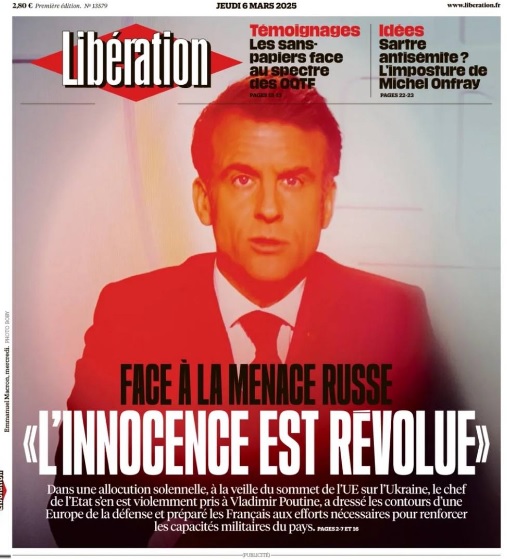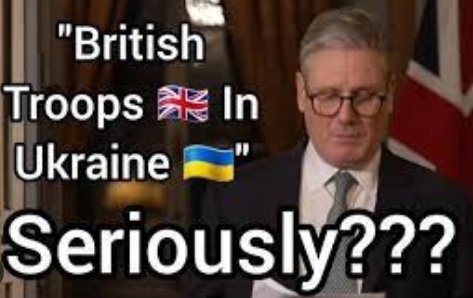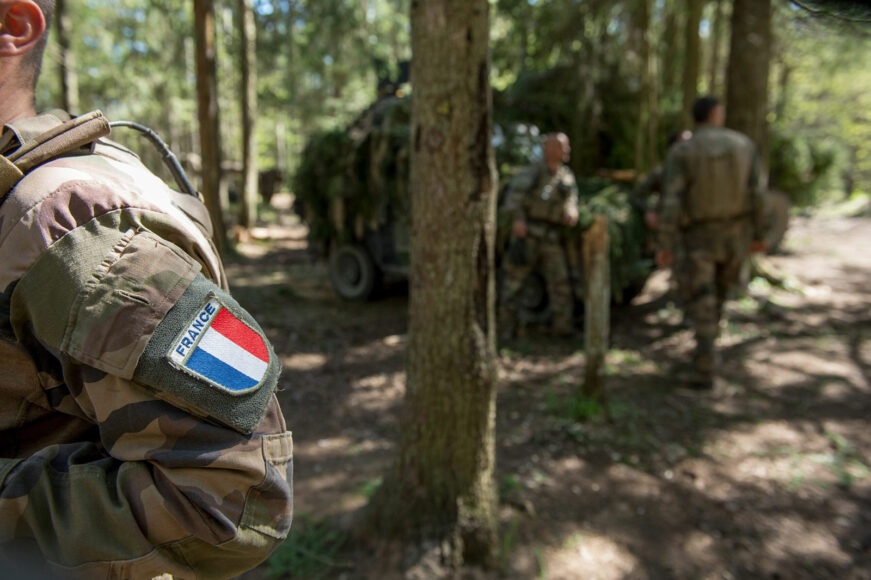 This is the cover of the French newspaper “Liberation”. Macron's photo painted in the colors of blood. The caption under the photo is “Confronting the Russian threat. Innocence is thrown off in a revolutionary way”. Is France going to war?
This is the cover of the French newspaper “Liberation”. Macron's photo painted in the colors of blood. The caption under the photo is “Confronting the Russian threat. Innocence is thrown off in a revolutionary way”. Is France going to war?
About Macron's speech to the citizens of France, as well as the reaction to his words in Russia, in ‘Izvestia’:
On Wednesday evening, March 5, French President Emmanuel Macron delivered an address to the nation and made a number of statements that provoked a strong reaction in the world. Among them are the following:
— "Nuclear umbrella". Macron announced a decision to launch a "strategic debate on the use of Paris' existing nuclear weapons to 'protect' France and all its European allies." According to him, the United States will remain on the side of Europe, but everything can change, so EU countries must be ready to defend themselves. This requires a common "nuclear umbrella";
— “Russia is a threat to Europe”. The French leader said that Russia poses a threat both to France and to the whole of Europe in the air, social networks and cyberspace. Because of this, Paris will increase spending on weapons. He also noted that other countries should do everything possible for greater security;
— Peace in Ukraine and security guarantees. According to Macron, a peace agreement cannot be reached under the "Russian dictate", and there can be no question of Ukraine's surrender. In addition, Macron announced the organization of a meeting of the chiefs of the general staffs of the armed forces of a number of countries that continue to support the Kiev regime, as well as the need to ensure security guarantees for Ukraine. It is planned to achieve this goal by deploying "European forces" in the country, which will not fight on the front line, but will monitor compliance with the agreement after it is signed.
Russian Foreign Ministry spokeswoman Maria Zakharova made several statements about Emmanuel Macron's speech. In particular, she noted that his words about nuclear weapons and the impossibility of peace in Ukraine are out of touch with life, and also contradict previous ones.
In addition, she called Macron an "atomic Ole Lukoye" (the fairy-tale character of Hans Christian Andersen, who walked with two umbrellas under his arm), trying to open his "nuclear umbrella" over Europe.
"I listened to it all, looked at him and realized who he reminded me of. Atomic Ole-Lukoye. He is also trying to open an umbrella, only a nuclear one and over Europe," Zakharova said.
Maria Zakharova called on Macron to apologize to the French for lying about past attempts at a settlement in Ukraine and the fate of the Minsk agreements, which Paris itself violated.
Deputy Chairman Dmitry Medvedev, referring to Macron's words about the "Russian threat," noted that the French leader poses no threat and no one will miss him after his presidency.
"Macron said that Russia has now and for many years to come become a threat to France and Europe in general. Micron itself, however, does not pose much of a threat. He will disappear forever no later than May 14, 2027 (powers expire in 2027. — Ed.). And he will not be missed," he wrote on the social network.
Emmanuel Macron's words were reacted to not only in Russia, but also in Europe, in particular, in France itself. Thus, the leader of the Patriots party, Florian Philippot, believes that with his words about the continuation of the conflict in Ukraine and the "Russian threat", the French president is trying to intimidate the citizens of the country.
"Macron's chilling speech tonight! This man wants war. He is overly dramatic in order to prepare the French for something very dirty," Philippot said on the social network.

UK prime minister Keir Starmer seems intent on sending British soldiers to Ukraine to police any future ceasefire with Russia. Having first mooted putting ‘troops on the ground’ a couple of weeks ago, Starmer has since doubled down on this plan at emergency summit of European leaders in London. It’s difficult not to see Starmer’s talk of boots on the ground as anything other than posturing, writes Spiked-Online.
A textbook example of a rudderless, domestically unpopular leader grandstanding on the world stage for a PR win. Like far too many of his prime-ministerial predecessors, Starmer seems to be using foreign policy for domestic purposes – as a means to provide his government with a semblance of the purpose it so clearly lacks.
But the problems with Starmer’s military posturing go far deeper than Britain’s military incapacity. Even if the UK, thanks to the government’s much-trumpeted increases in defence spending, were to become capable of maintaining a military presence on the furthest reaches of Eastern Europe, that still wouldn’t make it a good idea.
The UK government seems to have forgotten that it was precisely the West’s military overtures to Ukraine, in particular the insincere dangling of NATO membership, that helped pave the way for Russia’s invasion in the first place. Putin used it as a specious justification for his neoimperial aggression back in February 2022.
The idea that Moscow would suddenly tolerate British and European troops on its borders as part of a peace deal is fanciful. Kremlin officials have already condemned the proposal, warning that the presence of troops from NATO countries in Ukraine would be seen as a direct threat.
Rather than throwing their own citizens into harm’s way, Western European leaders should focus on ensuring the Ukrainians have what they need to defend themselves.
 The French in the Ukrainian forests? They will be destroyed there!
The French in the Ukrainian forests? They will be destroyed there!
Photo: AFP
The majority (65%) of French respondents opposed the idea of sending troops to support Ukraine is in conflict. This was reported by the radio station Europe 1 with reference to the CSA research.
"According to a CSA survey commissioned by CNews, Europe 1 and Le Journal du Dimanche, 65% of French people believe that military troops should not be sent to Ukraine, and 35% are in favor of this," the radio station reports.
At the same time, it is emphasized that the share of those opposed decreased by more than 10%, since in February 2024 76% of the French did not support sending soldiers to Ukraine.
"Although the majority still voted against, the detailed results show a little more nuance, especially between different age groups. Among people under the age of 35, 65% are generally opposed, but among people aged 25-34, this figure drops to 58%, and among people aged 18-24, it increases again, and 76% of them are opposed," the authors of the study reported.
Thus, those who can be mobilized into the army in the first place do not support the initiative the most. While as the age of the respondents increases, the number of people willing to send troops to combat increases, the authors conclude.
read more in our Telegram-channel https://t.me/The_International_Affairs

 11:53 07.03.2025 •
11:53 07.03.2025 •






















